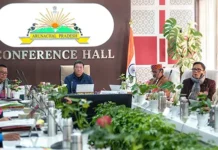DIRANG, 17 Nov: Experts from the National Research Centre on Yak (NRCY) here in West Kameng district, led by NRCY Director Dr Mihir Sarkar, conducted three ‘awareness-cum-supportive programmes’ on scientific yak husbandry, in collaboration with Ladakh’s animal husbandry department, at Hanlay and Khaltse in Leh district, and at Bodhkharboo in Kargil district of Ladakh union territory from 8 to 11 November.
Three hundred tribal livestock farmers, mostly dependent on yak and yak-cattle hybrids for their livelihood, benefitted through these programmes.
“The farmers were educated on fodder cultivation and conservation, scientific breeding, and value addition of animal produce for improving their earnings,” the NRCY informed in a release.
Ladakh’s Animal, Sheep Husbandry & Fisheries Director Dr Mohd Iqbal, Leh’s Chief Animal Husbandry Officer Dr Stanzin Ragbais, and other officials also attended the programmes.
Dr Iqbal encouraged the participants to “follow the scientific rearing and management practices and opt for yak fibre processing technologies of the institute, like chawar-making, for optimum utilisation of the mostly wasted yak fibre for regular income generation.”
Rigzin, a yak farmer from Demchok, raised concern over the predation of yaks by wild animals, and sought government intervention and incentives to shield their animals against mishaps and other uncertainties.
Bodhkharboo Councillor Padma Dorje, Kargil Livestock Development Officer Dr Gulzar Hussain, and Dr Ashiq from the Kargil animal husbandry department attended the programme conducted in Bodhkharboo, where 100 yaks and yak-cattle hybrid rearers were apprised of scientific management of yak. The NRCY’s scientists also presented a chawar-making demonstration.
Ladakh Autonomous Hill Development Council Executive Councillor Tashi Gyalson expressed gratitude to the NRCY for its sincere efforts in promoting yak rearing in Ladakh with scientific and supportive inputs.
The farmers were advised to adopt the NRCY’s artificial insemination and fodder conservation technologies for overall improvement of yak husbandry in Ladakh.
At the end of each programme, all the participating farmers were provided with supportive inputs like tents/tarpaulins, gumboots, solar lights, raincoats, concentrate yak feed, chelated mineral mixtures, and basic veterinary medicines.
The programmes were coordinated by NRCY principal scientists Drs D Medhi and V Paul, in collaboration with the officials and staffers of the Ladakh’s animal husbandry department.




